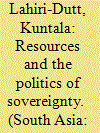| Srl | Item |
| 1 |
ID:
171516


|
|
|
|
|
| Summary/Abstract |
Successful electrification of cities' heating and cooling demands depends on the sustainable implementation of highly efficient ground source heat pumps (GSHP). During the last decade, the use of shallow geothermal energy (SGE) resources in urban areas has experienced an unprecedented boost which nowadays is still showing a steady 9% market growth trend. However, the intensive market incorporation experienced by this technology entails different responsibilities towards the long-term technical and environmental sustainability in order to maintain this positive trend. Here we present a SGE management framework structure and a governance model agreed among 13 European Geological Surveys, providing a roadmap for the different levels of management development, adaptable to any urban scale, and independent of the hydrogeological conditions and the grade of development of SGE technology implementation. The management approach reported is based on the adaptive management concept, thus offering a working flow for the non-linear relationship between planning, implementation and control that establishes a cyclical and iterative management process. The generalized structure of the SGE management framework provided allows the effective analysis of policy to identify and plan for management problems and to select the best management objectives, strategies and measures according to the policy principles proposed here.
|
|
|
|
|
|
|
|
|
|
|
|
|
|
|
|
| 2 |
ID:
126103


|
|
|
|
|
| Publication |
2013.
|
| Summary/Abstract |
While oil and gas industries are already well established in Siberia and Alaska, the melting of the Arctic ice cap is opening up new areas of the High North to hydrocarbon exploration. According to the US Geological Survey (USGS), the Arctic is expected to hold about 22 per cent of the world's undiscovered, technically recoverable conventional oil and natural gas resources (about 13 per cent of undiscovered oil reserves, 30 per cent of natural gas, and 20 per cent of natural gas liquids). 1 Greenland waters are believed to be particularly rich in oil, and may contain reserves of up to 50 billion barrels, equivalent of Libyan oil reserves. 2 Of the Arctic Council's five member states bordering the Arctic Ocean, Russia and Norway have already submitted continental shelf claims to the Commission on the Limits of the Continental Shelf. Another two member states, Canada and Denmark (on behalf of Greenland) are in the process of submitting their claims. Sovereign rights to offshore hydrocarbon reserves are key issues at stake in these claims. While some analysts see the scenario as a 'scramble' for Arctic hydrocarbons, others highlight the huge technological difficulties of oil and gas extraction in the Arctic, and suggest that territorial disputes are relatively insignificant. 3 Nevertheless, the Arctic region's substantial mineral and hydrocarbon wealth makes issues of sovereignty and governance all the more important to stakeholders, including indigenous peoples as well as states.
|
|
|
|
|
|
|
|
|
|
|
|
|
|
|
|
| 3 |
ID:
152747


|
|
|
|
|
| Summary/Abstract |
This article considers the global governance of energy resources as a coordination problem to provide the intermediate global public good of payments and revenues disclosure. The demand for international arrangements to fill this gap resulted in the Extractive Industries Transparency Initiative and subsequent US and European Union disclosure standards for extractive industries. EITI has attributes of contested multilateralism such as being a multistakeholder voluntary coalition setting a standard for transparency. US and EU disclosure standards constitute unilateral pathways with a global vocation. The article argues that EITI and US and EU standards are simultaneously competing with and complementing each other, adding regime complexity but ultimately supplying higher disclosure standards in the energy sector.
|
|
|
|
|
|
|
|
|
|
|
|
|
|
|
|
| 4 |
ID:
157090


|
|
|
|
|
| Summary/Abstract |
This paper analyses the socio-legal and political spaces within which coal is mined in India and asks if it is possible to raise the ‘moral question’ when the state attributes an iconic status to coal. The empirical evidence comes from two indigenous-dominated states that practise community coal mining. If the coal mining communities in Jharkhand exert a moral claim by mining illegally, those in Meghalaya exert a political claim by invoking the special status the state enjoys under the Indian Constitution. This paper examines this grey zone of non-legality in order to understand resource conflicts and dispossession beyond the straightforward distinctions between legal and illegal.
|
|
|
|
|
|
|
|
|
|
|
|
|
|
|
|
| 5 |
ID:
107216


|
|
|